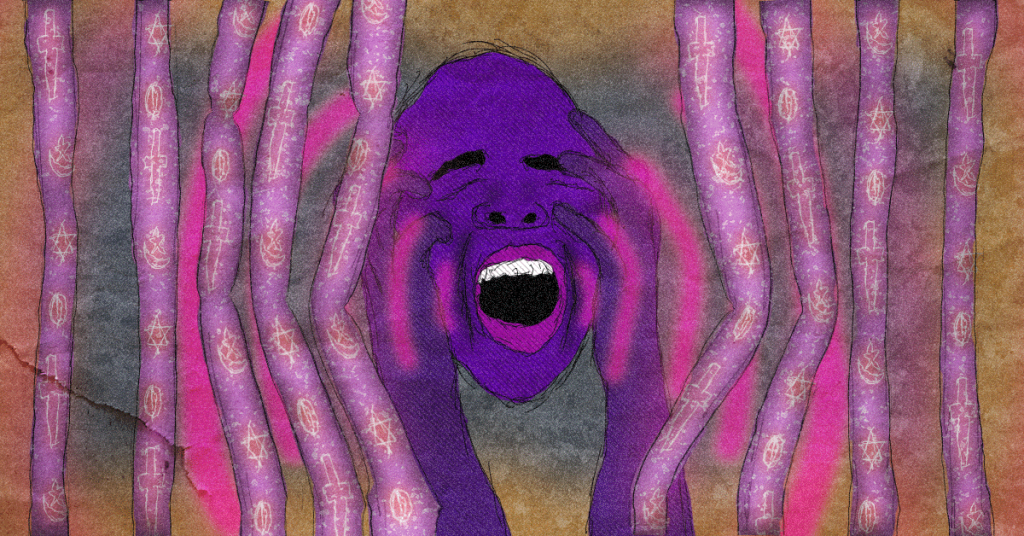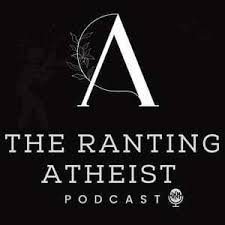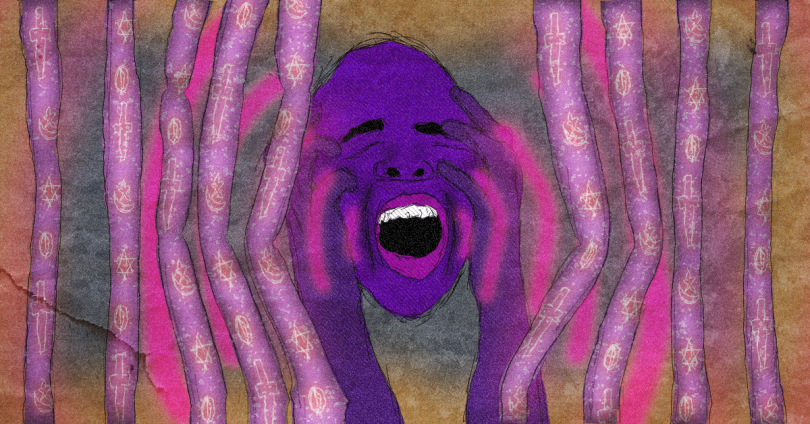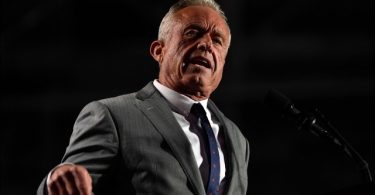Building community for irreligious Nigerians in a society where it is dangerous to be one.

By Mayowa Oyewale
Ibadan, Nigeria — At eight, Peter Ade gave his life to Christ in the Redeemed Christian Church of God (RCCG), one of the largest churches in Nigeria. Raised by pastors of the RCCG, Peter’s family attended church services from morning till evening every Sunday. There was no excuse for being unserious about the Christian faith, but Peter, now in his 30s, started looking at any form of Christianity with suspicion while in university.
“All my education had been Christian; there was no way I could become an atheist according to the plans my parents had for me,” he says.
Faced with strict rules in a Christian university where overly religious students turned in less-religious ones, roots for Peter’s scepticism began growing. When he graduated in 2011, Peter felt guilty and wanted to move closer to God, but found this hard as he had unresolved questions about the Bible.
Years later, in 2017, during the recession in Nigeria, he realised that everyone, irrespective of their religion and the God they worshipped, suffered. Still, Peter held onto the faith until it all crumbled in 2020.
During the pandemic, while everyone stayed indoors to quarantine themselves from the COVID-19 virus, religious leaders in Nigeria called on their fold to pay tithes and offerings despite jobs being in jeopardy. This infuriated Peter and further fuelled his doubts.
“I had a crippling existential crisis,” Peter recalls. “There were nights I would stay up having fresh questions in my mind. I watched YouTube videos debunking Christianity and subsequently had this pent-up anger. I felt robbed, fooled and cheated.”
By August 2020, Peter had already become an atheist. Needing a place to vent his views on Christianity, he opened a burner account on X (then Twitter), but this was not enough. Influenced by Gary Vaynerchuk’s podcasts, he decided to create irreligious content.
“Every church service, every sermon, every gospel, every prayer from the Bible or the Koran are all content. So if I wanted to create awareness of people that do not believe in God, all I had to do was create my own content,” he tells Minority Africa.
After days of researching how to create content, he decided to open a podcast, as it was safer and would secure anonymity from his parents.

“I called it The Ranting Atheist to embody the anger I was feeling towards religion then, an anger I am still feeling now.”
Founded in 2021, The Ranting Atheist is one of the few online platforms that provide safe spaces for irreligious Nigerians and Africans to have meaningful conversations about the dangers of religion on the continent.
With over 120 episodes, the podcast features series like The Story of an Atheist, a one-on-one show for irreligious Africans to share their deconversion stories and how they are faring in their newfound irreligious lives. Other series, like the Atheist Bible Study, and episodes from a Clubhouse room, are more communal as they feature freethinking Africans either dissecting religious texts or arguing topics sourced from X.
But Peter’s podcast was not the first atheist podcast in Nigeria. Jide Samuel Adigun, also known as Jaydon, created the Sceptical Jaydon Podcast in 2019 to air his unpopular opinions.
“Back then, conversations were only on Twitter,” Jide tells Minority Africa. Most of the atheist content around was Western, and he wanted a Nigerian narrative and perspective.

Like Peter, he had been consuming irreligious content from people who were from the West but realised the importance of an online base of local atheists with whom he could relate and intimate himself.
“For irreligiosity to be normalised, there needs to be more people. Humans always fear ideas they are not used to and do not understand,” Peter says.
Leo Igwe, founder of the Humanist Association of Nigeria, believes that religion is organised to target the irreligious. Citing verses from religious texts that contain express condemnation for unbelievers, he demonstrates how this has affected the way atheists are being treated in the country.
“In Psalms 14 verse 1, the Bible says, ‘The fool has said in his heart that there is no God.’ Believers use this to tell you to your face that you are foolish. And when you go into the Koran, you see verses that demonise unbelievers. So, religion has always created an undignified space for the unbeliever, and this has affected the way non-believers relate. There are only three default boxes: Christian, Muslim, and Traditional Religion believer so that the unbeliever is forced to identify with one.”
Nigeria is one of the world’s most religious countries, with a report by Worldwide International Network Market affirming that over 90% of its population identifies as either Christian, Muslim, or adherents of Traditional African Religion. Only 1% of the population identifies as atheist, agnostic or non-religious.
In the Northern part of the country, there are draconian laws against blasphemy. When Mubarak Bala, the president of the Humanist Association of Nigeria, made a series of posts on Facebook expressing his unbeliefs in 2020, he was detained and sentenced to 24 years in prison two years later.
Leo, who had been an altar boy and a seminarian in his formative years, believes that although the Muslim North is popularly known for physical violence against ‘infidels’, the Christian South applies psychological and structural violence. Some people are abandoned by their parents, are threatened to be disowned or excommunicated, he says.
“I know at least three ex-Catholic priests in Imo State who have lost their faith in God. When one of them died, no one from his family wanted to bury him,” he says.
While many irreligious content creators have either stopped expressing their views or hide under pseudonyms when they do since the arrest of Mubarak Bala, some, especially in the Southwest of the country or in the African diaspora, are still abustle.
Funke Adewuyi, raised in Ibadan but now based in Canada, came out as an atheist in 2022. She ascribes this to the privilege of living outside the country where irreligious people are not endangered and discriminated against, as in Nigeria. Earlier this year, she created a WhatsApp group page for Nigerian feminist women who identify as atheists.
When she started her deconstruction journey years ago, Funke was also leaning towards feminism: “One of the facts I could not deny was the misogyny and sexism endorsed and encouraged in the Bible. Women were treated as properties and subhumans.”
Creators like Funke share the conviction that atheism has opened their minds to be accepting of liberal views and other minorities, such as the LGBTQ+ community, and represent them in their respective spaces.
“There is no justification to discriminate against anyone because of their identity,” Funke argues. Due to her humanist outlook since her deconversion, she has had to deal with internalised phobia towards the LGBTQ+ community as well as many other prejudices that she held as a believer.
For Peter, queerphobia and most forms of discrimination are rooted in religion. He admits that although he has met some homophobic atheists, most of the vitriol against the LGBTQ+ community comes mostly from religious folks.
Uju Anya, a Professor of Applied Linguistics at Carnegie Mellon University and a guest on one of Peter’s episodes on The Ranting Atheist, believes this is not true for pantheistic religions.
“Hating-the-gay thing is foreign to African nations and indigenous religions because our religions accept the reality of human diversity in appearance, expression, interests and desires. Homophobia and transphobia are rooted in misogyny, and popular indigenous African religions I know are matriarchal in terms of leadership and custodians of secrets, so for the queer person [in these spaces], there is no conflict between who you are and your religious practice.”
Tokunbo Eleniyan, 24, an active listener of The Ranting Atheist podcast who also identifies as queer, chanced upon the platform once he became irreligious and was looking for podcasts on Spotify that catered for people like him.
“Hearing different people freely talk about their thoughts as regards religion made me less lonely as an atheist, especially when I was accepting myself as so,” Tokunbo says.
He thinks The Ranting Atheist is very particular about being inclusive, such that minorities like the queer community can also have the freedom of expressing their atheism without being bullied or facing homophobic attacks.
“Atheism, for me, means freedom,” Uju says. “I am unburdened by the need to pretend that the supernatural is real. There is a lot of mental exhaustion when you hold two contradictory beliefs in your head.”
For Peter recollecting his path to irreligiosity provides the fuel for him to forge ahead.
“It was a lonely journey,” Peter recalls. “Just as they say salvation is personal, deconversion is personal as well. No atheist or Christian can influence you, belief or unbelief in God is all in your mind.”
This story was first published on Minority Africa and appears here with permission.








